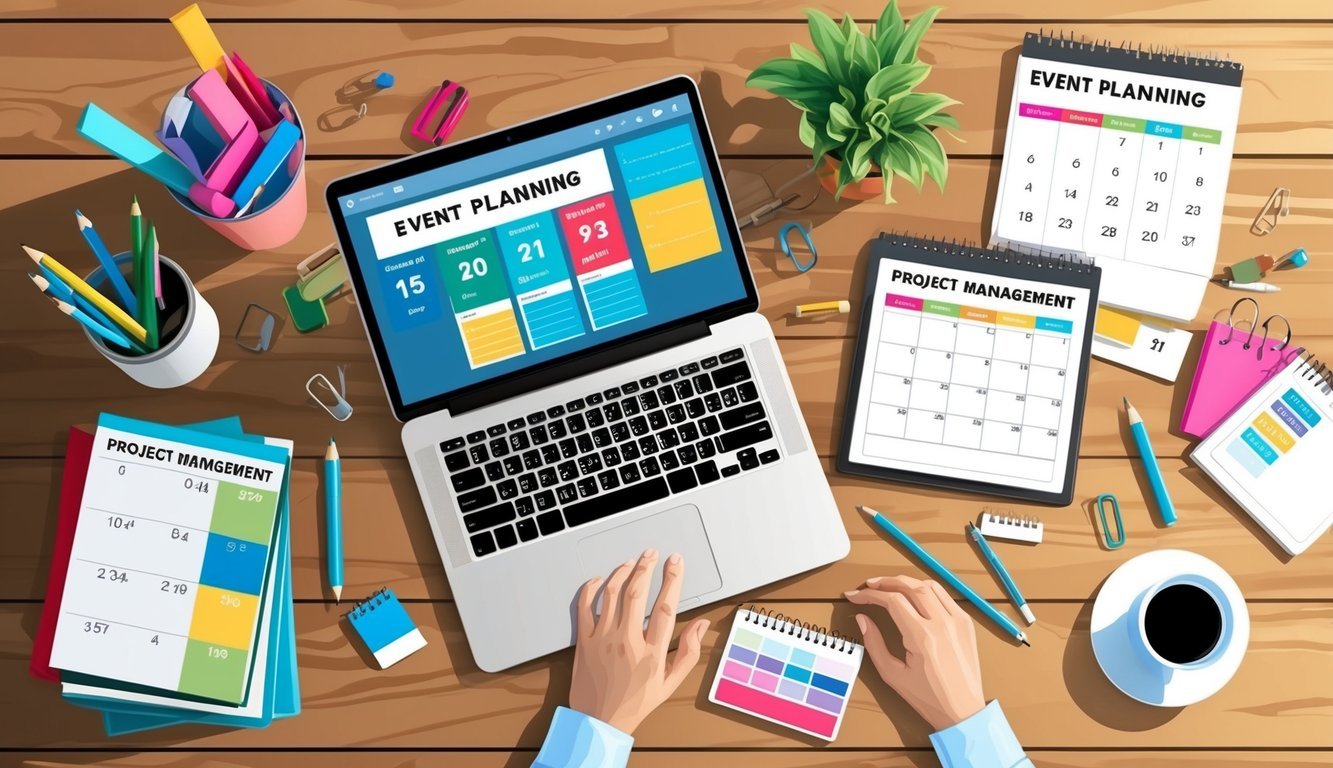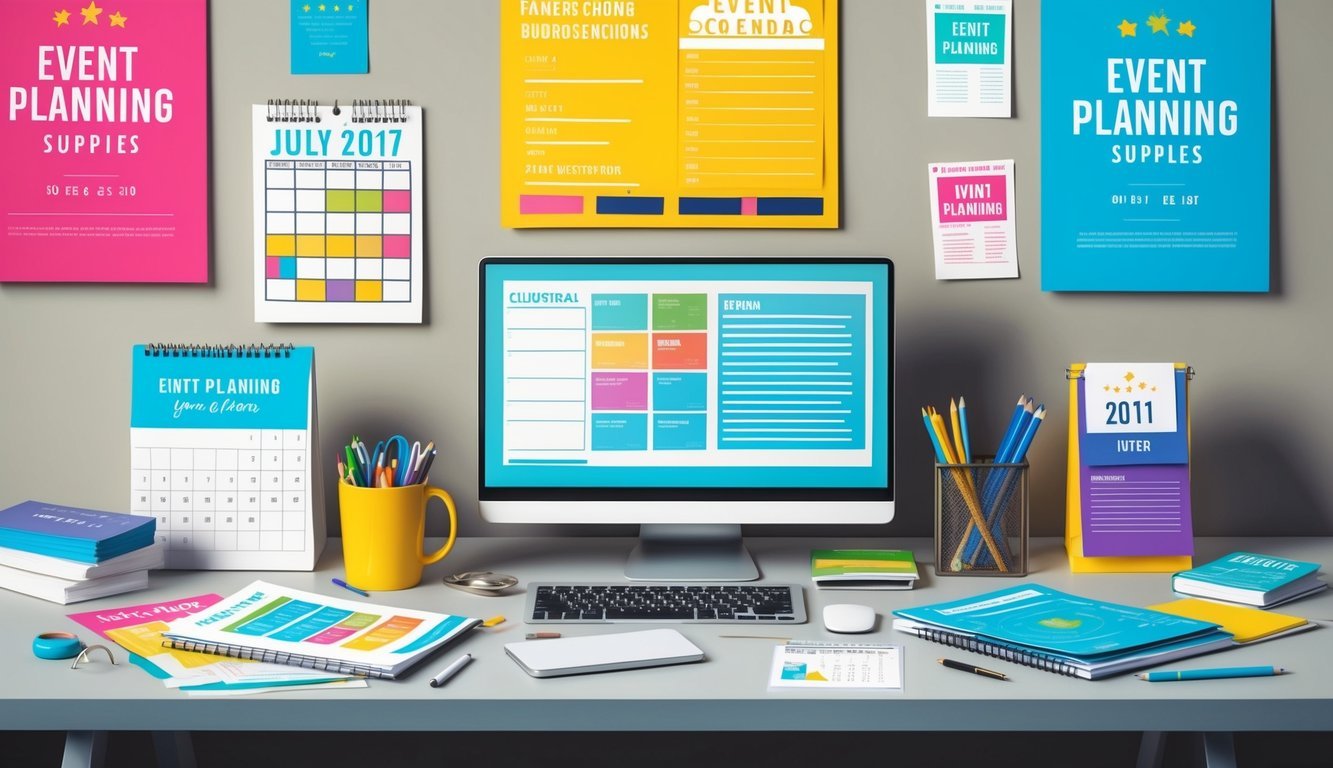Looking to turn your passion for organizing into profit? An event planning side hustle could be your ticket to extra income and creative fulfillment.
Whether you’re a natural party planner or simply love bringing people together, this flexible venture allows you to showcase your skills while building a rewarding business.
Starting an event planning side hustle requires minimal upfront investment and can be tailored to fit your schedule and interests. You might specialize in weddings, corporate events, or parties, depending on your preferences and local market demands.
With the right approach, you can transform your knack for organization and eye for detail into a thriving enterprise.
Ready to dive in? You’ll need to develop your brand, understand legal requirements, and hone your marketing skills.
But don’t worry – with dedication and the right resources, you can create memorable experiences for clients while padding your wallet.
Let’s explore how you can kickstart your event planning journey and make your mark in this exciting industry.
Key Takeaways
- Event planning side hustles offer flexibility and low startup costs
- Developing a unique brand and specialization is crucial for success
- Balancing client satisfaction with personal time management is key
Getting Started with Event Planning Side Hustle
Starting an event planning side hustle can be an exciting and rewarding venture.
With the right skills, niche focus, and industry knowledge, you can turn your passion for organizing into a profitable business.
Assessing Your Event Planning Skills
To succeed in event planning, you’ll need a mix of creativity and organizational skills.
Evaluate your strengths in these areas:
- Time management
- Budget planning
- Vendor negotiations
- Problem-solving
- Communication
Don’t worry if you’re not an expert in all areas yet.
You can improve with practice and experience.
Consider taking online courses or workshops to enhance your skills.
Many platforms offer event planning certifications that can boost your credibility.
Identifying Your Niche
Choosing a specific niche can help you stand out in the crowded event planning market.
Think about the types of events you enjoy most:
- Weddings
- Corporate conferences
- Birthday parties
- Charity fundraisers
- Music festivals
Your personal interests and strengths should guide your choice.
For example, if you love working with children, you might focus on planning kids’ birthday parties.
Research your local market to find underserved niches.
This can give you a competitive edge as you start your side hustle.
Understanding the Event Industry
Familiarize yourself with the event planning industry to set yourself up for success.
Stay updated on:
- Current trends in event design and technology
- Local venues and suppliers
- Pricing strategies for your services
- Legal requirements and insurance needs
Network with other event planners and vendors.
Join professional associations to access resources and potential mentors.
Keep an eye on emerging virtual and hybrid event opportunities.
These formats have become increasingly popular and can expand your service offerings.
Creating Your Event Planning Brand

Establishing a unique brand identity is crucial for your event planning side hustle.
A strong brand will help you stand out and attract clients.
Developing a Professional Website
A professional website is your digital storefront.
Create a clean, user-friendly site that showcases your services and style.
Include an “About” page that tells your story and highlights your experience.
Use high-quality images of events you’ve planned to give visitors a visual taste of your work.
Make sure your site is mobile-responsive, as many potential clients will view it on their phones.
Add a contact form and clear calls-to-action to make it easy for potential clients to reach out.
Consider including pricing information or packages to help visitors understand your offerings.
Building an Online Presence
Your online presence extends beyond your website.
Create social media profiles on platforms where your target audience spends time, like Instagram, Pinterest, and LinkedIn.
Share behind-the-scenes content, event photos, and planning tips to engage followers.
Use relevant hashtags to increase visibility.
Engage with other industry professionals and potential clients by commenting on and sharing their content.
Consider starting a blog on your website to share your expertise and improve your search engine rankings.
Write about topics like event planning tips or trends in the industry.
Crafting Your Event Portfolio
Your portfolio is a visual representation of your skills and style.
Choose your best work to showcase, focusing on diversity in event types and scales.
Include high-quality photos and brief descriptions of each event.
Highlight unique challenges you overcame or special touches that made the event memorable.
Consider creating both a digital and physical portfolio.
Your digital portfolio can be part of your website, while a physical version can be useful for in-person meetings.
Don’t forget to ask for testimonials from satisfied clients.
These personal recommendations can be powerful additions to your portfolio and website.
Legal and Financial Considerations

Starting an event planning side hustle requires careful attention to legal and financial matters.
You’ll need to set up your business properly and manage your finances effectively to ensure success.
Setting Up Your Business Structure
Choosing the right business structure is crucial for your event planning side hustle.
You might start as a sole proprietorship, which is simple to set up but offers less protection.
As you grow, consider forming an LLC to separate personal and business assets.
Don’t forget to register your business name and check for any conflicts.
This can save you from potential lawsuits down the road.
You’ll need to obtain necessary licenses and permits.
These vary by location, so check with your local government.
Insurance is also essential – look into general liability and professional indemnity policies.
Managing Finances and Budgeting
Keeping your finances in order is key to your side hustle’s success.
Open a separate business bank account to track income and expenses easily.
Create a detailed budget for each event.
Include all costs: venue, catering, decorations, staff, and your fee.
Don’t forget to factor in taxes and unexpected expenses.
Set your pricing carefully.
Research competitors and consider your experience level.
Don’t undervalue your services, but stay competitive.
Track all income and expenses meticulously.
This helps with taxes and gives you a clear picture of your earnings potential.
Consider using accounting software to simplify this process.
Remember to set aside money for taxes.
As a self-employed individual, you may need to pay quarterly estimated taxes.
Marketing and Networking

Marketing and networking are crucial for growing your event planning side hustle.
You’ll need to promote your services effectively and build valuable connections in the industry.
Leveraging Online Platforms
Start by creating a professional website showcasing your portfolio and services.
Use social media platforms like Instagram and Pinterest to share event photos and inspiration. Eventbrite can be a powerful tool for promoting your events and reaching potential clients.
Consider starting a blog or YouTube channel to share event planning tips and behind-the-scenes content.
This can help establish you as an expert in the field.
Don’t forget email marketing.
Build a mailing list of past and potential clients to keep them informed about your services and upcoming events.
Finding Networking Opportunities
Attend industry conferences and trade shows to meet vendors, suppliers, and fellow event planners.
These events are great for learning about new trends and making valuable connections.
Join professional associations like the International Live Events Association (ILEA) or Meeting Professionals International (MPI).
These organizations often host networking events and provide educational resources.
Look for local business networking groups in your area.
Chamber of Commerce events can be excellent opportunities to meet potential clients and partners.
Consider volunteering for charity events.
This can help you gain experience while also expanding your network in a meaningful way.
Services and Specialization
Event planning offers diverse opportunities to showcase your skills.
You can tailor your services to specific types of events and client needs.
Wedding and Party Planning
Wedding planning is a popular niche for event planners.
You’ll coordinate with couples to bring their dream day to life.
This involves managing vendors, creating timelines, and overseeing decorations.
Party planning is another exciting avenue.
You might organize:
- Birthday bashes
- Anniversaries
- Baby showers
- Graduation parties
Your role is to handle details like venue selection, catering, and entertainment.
Creativity is key in making each event unique and memorable.
Corporate and Community Events
Corporate events require a different approach.
You’ll work with businesses to plan:
- Conferences
- Product launches
- Team-building activities
- Holiday parties
Attention to detail and professionalism are crucial.
You’ll need to align events with company goals and brand image.
Community events allow you to bring people together.
These might include:
- Fundraisers
- Local festivals
- Charity runs
Your organizational skills will shine as you coordinate volunteers, manage budgets, and ensure smooth execution.
Virtual Event Planning
Virtual events have become increasingly popular.
As a virtual event planner, you’ll:
- Choose appropriate online platforms
- Manage technical aspects
- Ensure engaging content delivery
You might organize webinars, online conferences, or virtual team-building activities.
Adapting traditional event planning skills to the digital realm is essential.
Virtual events require a focus on attendee engagement and smooth technology integration.
You’ll need to be tech-savvy and creative in keeping participants interested throughout the event.
Managing Your Projects

Effective project management and the right software tools are crucial for success in event planning.
These elements help you stay organized, meet deadlines, and deliver exceptional events for your clients.
Effective Project Management
Start by breaking down each event into smaller, manageable tasks.
Create a timeline with clear milestones and deadlines.
This approach helps you track progress and identify potential issues early.
Prioritize tasks based on importance and urgency.
Focus on critical elements like venue booking and vendor coordination first.
Communication is key.
Keep your team and clients informed through regular updates.
Use brief, clear messages to avoid misunderstandings.
Be flexible and ready to adapt.
Events often face unexpected challenges, so have backup plans ready.
Delegate tasks effectively.
Assign responsibilities based on team members’ strengths and expertise.
This maximizes efficiency and ensures quality results.
Utilizing Event Management Software
Event management software can streamline your planning process.
Look for tools that offer features like task management, budget tracking, and guest list management.
Choose software that integrates with other tools you use, like email or accounting programs.
This integration saves time and reduces errors.
Use the software to create and share event timelines.
This keeps everyone on the same page and helps prevent last-minute rushes.
Take advantage of budgeting features to track expenses and stay within financial limits.
Many tools offer real-time updates, helping you make informed decisions.
Guest management features can simplify RSVPs, seating arrangements, and dietary requirements.
This attention to detail impresses clients and enhances the guest experience.
Coordinating Event Details
When coordinating event details, start by creating a comprehensive checklist.
This will help you stay organized and on top of every aspect.
Consider the venue layout and design early in the process.
You’ll want to map out the space and plan where everything will go.
This includes seating arrangements, stage setup, and any special areas like photo booths or food stations.
Don’t forget about the event theme! It should influence your decisions on decor, lighting, and even menu choices.
You might want to create a mood board to help visualize the overall aesthetic.
Timing is everything in event planning.
Create a detailed timeline for the day, including setup, guest arrival, activities, and breakdown.
Be sure to build in some buffer time for unexpected hiccups.
Lastly, communicate clearly with all vendors and staff.
Provide them with detailed instructions and schedules to ensure everyone is on the same page.
Growing Your Side Hustle

Expanding your event planning side hustle requires strategic thinking and a willingness to learn.
You’ll need to diversify your offerings and seek guidance from experienced professionals to take your business to the next level.
Expanding Your Services
To grow your event planning side hustle, consider broadening your range of services.
Think about adding corporate events, weddings, or themed parties to your repertoire.
You could also offer complementary services like décor rental or day-of coordination.
Develop a strong online presence to showcase your expanded offerings.
Use social media and a professional website to highlight your diverse portfolio.
Share photos and client testimonials to build credibility.
Network within the industry to find new opportunities.
Attend trade shows and join professional associations to stay updated on trends and make valuable connections.
Seeking Mentorship and Collaboration
Finding a mentor can significantly accelerate your growth.
Look for experienced event planners who can guide you through challenges and share insider tips.
You might find mentors through industry events or online communities.
Consider collaborating with other professionals in related fields.
Partner with florists, caterers, or photographers to offer comprehensive packages.
These partnerships can lead to referrals and help you provide better service to your clients.
Join local business groups or entrepreneurship circles.
These communities can provide support, advice, and potential collaboration opportunities as you grow your side hustle.
Client Relations and Satisfaction
Building strong client relationships and delivering exceptional service are crucial for a successful event planning side hustle.
Your ability to understand client needs, communicate effectively, and exceed expectations will set you apart in this competitive industry.
Delivering Memorable Experiences
To create unforgettable events, focus on personalization and attention to detail.
Listen carefully to your clients’ vision and preferences.
Incorporate unique touches that reflect their personality or brand.
Surprise your clients with thoughtful extras they didn’t expect.
This could be a custom welcome sign or a special dessert featuring their logo.
These small gestures often leave a lasting impression.
Stay on top of event planning trends to offer fresh ideas.
Suggest innovative themes, interactive elements, or cutting-edge technology to elevate the guest experience.
Always have a backup plan for potential issues.
Weather contingencies, vendor alternatives, and flexible timelines will help you handle unexpected challenges smoothly.
Maintaining High-Quality Customer Service
Communication is key in event planning.
Respond promptly to client inquiries and keep them updated throughout the planning process.
Be proactive in addressing concerns before they become problems.
Set clear expectations from the start.
Provide detailed contracts and timelines to avoid misunderstandings.
Be transparent about costs and any potential additional fees.
Develop a problem-solving mindset.
When issues arise, focus on finding solutions rather than placing blame.
Your ability to handle stress and remain calm will reassure your clients.
Seek feedback after each event.
Use surveys or follow-up calls to gather insights on what worked well and areas for improvement.
This shows you value their opinion and are committed to growth.
Remember, your reputation is built on client satisfaction.
Go above and beyond to ensure every interaction leaves a positive impression.
Work-Life Balance and Self-Care

Balancing an event planning side hustle with your personal life can be challenging.
Prioritizing self-care and managing your time effectively are crucial for long-term success and personal satisfaction.
Managing Time Commitment
Slow and steady can help you win the race with your event planning side hustle.
Start by setting realistic goals and creating a schedule that allows for both work and personal time.
Use time management tools to track your hours and prioritize tasks.
Consider these strategies:
- Block out specific hours for your side hustle
- Use productivity apps to stay focused
- Delegate tasks when possible
- Learn to say no to non-essential commitments
Remember, it’s okay to grow your business gradually.
Quality over quantity is key in event planning.
Practicing Self-Care as an Entrepreneur
Balancing self-care with your side hustle is essential for avoiding burnout.
Make time for activities that recharge you mentally and physically.
Try these self-care tips:
- Schedule regular breaks throughout your day
- Exercise for at least 30 minutes daily
- Practice mindfulness or meditation
- Maintain a healthy sleep schedule
Don’t forget to take care of your health.
Eat nutritious meals, stay hydrated, and make time for regular check-ups.
Your event planning business will thrive when you’re at your best.
Frequently Asked Questions
Event planning as a side hustle raises many questions about getting started, pricing, and potential income.
Here are answers to some common queries to help you launch your event planning venture.
How can someone dive into event planning with zero experience?
Start by volunteering for local events to gain hands-on experience.
Attend industry conferences and workshops to learn from seasoned professionals.
Consider taking online courses in event management to build your skillset.
Network with vendors and other planners to start building relationships in the industry.
What essentials should be in my starter kit for event planning?
Your starter kit should include a reliable laptop, smartphone, and planner or digital calendar.
Invest in event planning software to help manage tasks and timelines.
Include a portable Wi-Fi hotspot, business cards, and a basic emergency kit with items like safety pins and stain removers.
What are some creative ideas for an event planning side gig?
Consider specializing in eco-friendly or sustainable events.
Offer virtual event planning services for online conferences or webinars.
Plan themed parties for niche markets, like cosplay gatherings or retro-themed celebrations.
Create pop-up dining experiences or organize local food and wine tasting events.
How do I determine pricing for my event planning services?
Research local competitors to understand market rates.
Consider charging a percentage of the total event budget, typically 10-20%.
Alternatively, set hourly rates or create package deals for different types of events.
Factor in your experience level and the complexity of each event when setting prices.
Are there particular types of events that tend to be more profitable for planners?
Corporate events and weddings often have larger budgets, making them potentially more profitable.
High-end social events like milestone birthdays or anniversaries can also be lucrative.
Recurring events, such as annual conferences or fundraisers, can provide steady income once you establish a relationship with the client.
What realistic income can I expect from planning events part-time?
Income varies widely based on your location, experience, and types of events you plan.
As a part-time side hustle, you might earn anywhere from a few hundred to several thousand dollars per month.
With experience and a solid client base, some part-time event planners report earning $20,000 to $30,000 annually.
Remember that building a profitable business takes time and effort.


